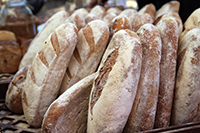
Tricks of the Trade: January/February 2012
February 3, 2012
By
FORMA-LAB
The correct sour gives your bread character and helps it stand out from the competition

|
|
| Breads with an acid or sour flavour are popular in artisan production.
|
Some bakers want to add a sour taste to their breads. Certain suppliers recommend using a “concentrated flavour of sour” instead of making a real sourdough (levain). Also, the majority of sliced breads we buy are made from sponge. This sponge is made with yeast, which generally needs to ferment from four to 12 hours.
However, the new tendency for artisan production is to create bread with an acid flavour addition or a very acidic natural sour. This sour taste can be achieved by adding dehydrated sour in powder form or by adding liquid levain while controlling the pH.
These products are sold for use in various percentages. Generally the more concentrated the dose, the higher the purchasing price will be, but the cost will be lower (see table). Here’s a breakdown of the types of sours you can choose from.
Powder sour
These products contain lactic and fumaric acid, which will give bread perfumed, long fermentation without having to make a sour. Powder sours are made from wheat or rye flour fermented and dehydrated using techniques that preserve the aromas of the sour, giving products the smell of a long traditional fermentation.
Remember that these dehydrated products have no fermentation power on their own; the proper dose of yeast must be maintained.
Advantages: easy to weigh, consistent quality, allows for increased hydration, can be added in all bread making processes.
Disadvantages: cannot be declared natural leavened bread unless using a maximum of 0.2 per cent fresh yeast with long fermentation.
Liquid sponges
Based on a fermentation of yeast, flour and water, sponges add an acid aroma to the bread. The sponge must be cooled and mixed before use to avoid introducing deposits or lumps into the bread.
Advantages: clean label, results in a controlled pH, can be added in all bread making processes.
Disadvantages: reduces hydration, does not replace yeast.
Natural sour (levain)
Made from the master head to yield a ready sponge, this is what we call natural levain made without yeast. This sour requires more knowledge to control the pH. It is ready in three days and must be refreshed every day. The connoisseurs say that a master sleeps with his levain, because it requires so much care.
Advantages: yields natural leavened bread, good texture and taste, prolongs the bread’s freshness.
Disadvantages: difficult to control, temperatures required too cool for everyday use, must carefully control hygiene in the sour.
Starters sour
The last novelty is a living culture for ease of preparation of the master sour. It strikes a balance between the lactic bacteria and the various sorts of yeast.
These starters are diluted in water with a temperature ranging from 30 C to 38 C (86 F to 100 F). They are then mixed in flour to ferment at 28 C plus or minus 2 C (82 F plus or minus 3.6 F) for 16 to 24 hours. A sour (levain) made with starters can be solid or liquid depending on the hydration and the preferred bread making method.
Starters offer varying levels of acidity:
- Low acidity for brioches and sweet dough
- Average acidity for leavened bread, ciabatta, etc.
- Strong acidity for leavened bread, country style or certain types of sourdough (for example, San Francisco)
Advantages: produces a naturally leavened bread, assures performance and consistency, prolongs freshness, improves the texture and frees a baker from the constraints of a refreshed starter.
Disadvantages: must be preserved in cold temperatures, expensive and must be made every day.
A sour made naturally over three days and one made with a starter over 24 hours gives the same end result. From a master sour, you are allowed to add 0.1 per cent of instant yeast or 0.2 per cent of fresh yeast and still call your product natural leavened bread. This bread will require a minimum of two hours of floor time and two hours of final fermentation on canvas or in a proofer.
Mario Fortin is an international bakery consultant and owner of FORMA-LAB, a consulting service for bakers and suppliers. If you need technical information, send your questions to info@forma-lab.com .
Print this page
Leave a Reply